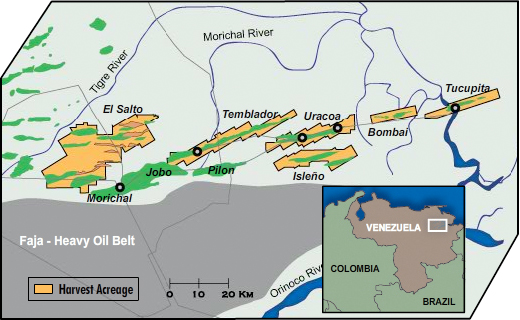After years of struggling to negotiate with Venezuela, Harvest Natural Resources exits the country
Houston-based Harvest Natural Resources (ticker: HNR) has closed its deal with private equity firm CT Energy Holding SRL for HNR’s Venezuela assets.
The closing of the deal marks the end of more than two years in which the company has been trying unsuccessfully to divest its assets in the OPEC nation. Many of the obstacles arose from the Venezuelan government adding extra-contractual conditions to previous sales, making them unattractive to buyers.
At the closing, Harvest received $80 million in cash, a $12 million six-month 11% note payable to Harvest by the purchaser, and cancellation of $30 million in debt owed by Harvest to CT Energy, HNR said in a press release Friday.
Harvest used part of this cash consideration to pay the remaining debt it owed to CT Energy and for other expenses and adjustments associated with the transaction. Net cash proceeds received after paying the above closing adjustments and other expenses was $69.4 million.
Also at the closing, CT Energy relinquished its 8,667,597 shares of Harvest common stock, which will be held as treasury shares, and agreed to terminate the warrant, issued in June 2015, to purchase up to an additional 34,070,820 shares of Harvest common stock. With the return of the shares held by CT Energy, Harvest now has 44,318,567 outstanding shares.
The long road out of Venezuela
CT Energy is not the first group to try and purchase Harvest’s assets as the company looked to exit Venezuela. In 2012, Indonesia’s state-owned Pertamina for $725 million in an all-cash deal that was expected to net $525 million to Harvest after taxes and transaction costs. The deal would later be canceled by the government of Indonesia, leaving Harvest looking for a new buyer.
In September 2013, the company again tried to sell its assets, this time to Venezuelan energy company Pluspetrol. Total consideration for the deal was just $373 million this time, including the assumption of Harvest’s long-term debt. This time the deal fell through because the government of Venezuela would not approve the sale in Petrodelta – Harvest’s joint venture with the Venezuelan government – without first receiving an “unspecified bonus payment” for access to Petrodelta’s reserves and $1.52 billion in financing for the joint venture.
Harvest President and CEO James Edmiston said “After three years of our best efforts, we are both disappointed and frustrated that the sale of our interests in Petrodelta has once again been effectively denied by the Government of Venezuela and CVP,” following the news.
After years of fruitless negotiations with Venezuela for owed oil production revenue and past dividend payments, and for apparently squashing the sale of Harvest’s interest in Petrodelta for the second time, the company took the only path left open to protecting its investment in the OPEC nation. After years of getting nowhere with normal business to business communications, Harvest decided to take its case to the World Bank’s International Centre for Settlement of Investment Disputes (ICSID) in Washington, D.C.
“Over the past decade, the Venezuelan Government has violated Harvest’s rights as an investor by systematically thwarting the development of Harvest’s investment in Venezuela as well as the company’s ability to sell its interests there,” Edmiston said in a company press release issued Jan. 16.
“Harvest’s two attempts to sell its remaining interests in Venezuela, both of which were fully vetted with the appropriate authorities prior to undertaking either transaction, ended in the imposition of wholly unreasonable and extra-contractual conditions on the sale by Venezuela authorities, directly leading to the failure of both transactions.
“This is not the outcome of our 22 years in Venezuela that we envisioned or desired,” Edmiston said in the press release, “but it’s the only means left to Harvest to protect our investment.”
Harvest would eventually withdraw its claim due to a delay caused by not “going through a process established in the shareholders’ agreement with [Venezuela’s state-owned] Petroandina or obtaining a waiver of that process,” according to Edmiston in the company’s press release.
It appears now though that the company has finally found its exit from Venezuela with CT Energy. Even considering the debt-forgiveness and the $12 million note, however, the deal value is less than one-fifth of the $725 million offered by Indonesia when the company originally looked to exit Venezuela.


